John P. Condron, M.S.
Service Address: 440 E. Clark St., Ste. A. Pocatello, ID 83201 / 208-233-1276 / FAX 233-0835
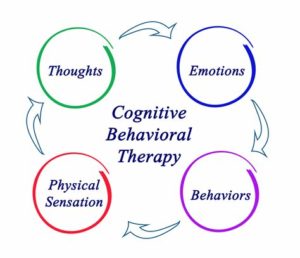 Philosophy and Approach: I am primarily a cognitive behavior therapist, which means I focus on helping people change their own thoughts and behaviors. I will not try to tell you what to think, but I will help you change how you think. I will also ask you to make small changes in your day-to-day behavior, with the intention of using those to gradually change your emotions.
Philosophy and Approach: I am primarily a cognitive behavior therapist, which means I focus on helping people change their own thoughts and behaviors. I will not try to tell you what to think, but I will help you change how you think. I will also ask you to make small changes in your day-to-day behavior, with the intention of using those to gradually change your emotions.
I use a wide range of evidence-based therapeutic approaches, all in the cognitive behavior therapy family, including Dialectical Behavior Therapy (DBT), Acceptance and Commitment Therapy (ACT), Trauma Focused Cognitive Behavior Therapy (TF-CBT), Bilateral Stimulation (also known as “EMDR”) and Hypnotherapy.
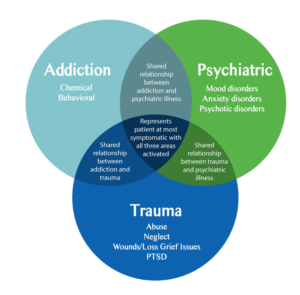 Specialties: I am well prepared to help adults, adolescents and children with a wide range of psychiatric disorders, but I think of myself as a trauma therapist who specializes in addictions and in human sexuality.
Specialties: I am well prepared to help adults, adolescents and children with a wide range of psychiatric disorders, but I think of myself as a trauma therapist who specializes in addictions and in human sexuality.
I started my career in the early 1980s as an addictions counselor, and quickly realized that almost all of my clients had experienced significant trauma. Not all that much was known about trauma back then. After all, “Posttraumatic Stress Disorder” (PTSD) was not even added to the American Psychiatric Association’s Diagnostic and Statistical Manual until1980!. But over subsequent decades I have learned a lot, and am now certified by the International Association of Trauma Professionals as a Certified Clinical Trauma Professional. Though many people associate trauma and PTSD with soldiers and warfare, many of my clients have experienced sexual or religious trauma, as children, adults, or both. In fact, many people have come to me for help with sexual and relationship problems and only later realized they were suffering from the long-term effects of trauma. As with trauma, I completed several hundred hours of training in sex therapy, primarily from the Institute for Sexuality Education and Enlightenment, but from many other sources, as well.
Education and Training: I hold a Master of Science degree in Behavior Analysis and Therapy from Southern Illinois University at Carbondale and additional training in Counseling from Rollins College (Florida) and Idaho State University. I am required to obtain a minimum of twenty hours per year of continuing education relevant to the practice of Counseling, though I am endlessly curious and typically complete far more than that each year.
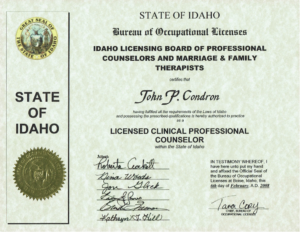 Licenses / Registration: In the United States, the practice of Counseling is governed by the states, rather than by the federal government. I am currently licensed as a Counselor by the States of Idaho, Washington, and Utah. I am also registered to provide counseling via telehealth by the State of Florida.
Licenses / Registration: In the United States, the practice of Counseling is governed by the states, rather than by the federal government. I am currently licensed as a Counselor by the States of Idaho, Washington, and Utah. I am also registered to provide counseling via telehealth by the State of Florida.
Each of the states listed below has granted me permission to practice as a Counselor, based on my education and training, supervised experience, and passage of two licensing exams. I am required to obtain ongoing continuing education to maintain each of these licenses.
I am also “registered” by the State of Florida as a telehealth provider, based on my licensure in other states. This has the same practical effect as licensure, as I have been granted permission to practice counseling via telehealth with clients located in the State of Florida based on my licensure in other states, and I am subject to regulation by the State of Florida as if I was licensed there.
To learn more about the requirements for licensure, registration or certification in each of the various states, you can click the hyperlinks below:
- IDAHO – Licensed Clinical Professional Counselor (LCPC-3868) – Idaho Bureau of Occupational Licenses (2/6/08; previously licensed as LPC-919 2/8/2000)
- UTAH – Licensed Clinical Mental Health Counselor (CMHC-11743381-6004) – Utah Division of Occupational and Professional Licensing (7/22/2020)
- FLORIDA – Registered Out-of-State Telehealth Provider (Profession 9646; Registration 353) – Florida Dept. of Health. Division of Medical Quality Assurance, Bureau of Health Care Practitioner Regulation, Telehealth (8/3/2020)
- WASHINGTON – Licensed Mental Health Counselor (LH-61090274) – Washington State Dept. of Health (2/22/2020)
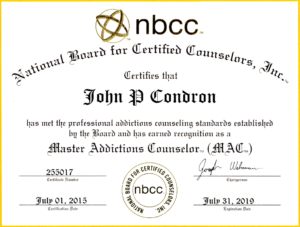 Certifications: I also hold a variety of certifications. This is not the same as licensure. Licenses are granted by states, which have enforcement powers over licensees. Certificates are generally issued by private organizations, which do not. Some require continuing education; some do not. Some have their own Codes of Conduct; some do not. Truthfully, some very fancy sounding certificates mean very little. Each of the following certifications represent significant training and experience:
Certifications: I also hold a variety of certifications. This is not the same as licensure. Licenses are granted by states, which have enforcement powers over licensees. Certificates are generally issued by private organizations, which do not. Some require continuing education; some do not. Some have their own Codes of Conduct; some do not. Truthfully, some very fancy sounding certificates mean very little. Each of the following certifications represent significant training and experience:
- Master Addiction Counselor (MAC-255017) – National Board for Certified Counselors (7/1/2015)
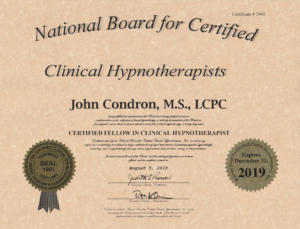 Certified Fellow in Clinical Hypnotherapy – National Board for Certified Clinical Hypnotherapists (8/5/2019)
Certified Fellow in Clinical Hypnotherapy – National Board for Certified Clinical Hypnotherapists (8/5/2019)- Certified Clinical Trauma Professional – International Association of Trauma Professionals (8/28/2017)
- Dialectical Behavior Therapist – DBT National Certification and Accreditation Association (10/20/2016)
- Trauma Focused Cognitive Behavior Therapist – TF-CBT Therapist Certification Program
- Approved Clinical Supervisor – BPA Substance Use Disorders
- Registered Supervisor – Idaho Board of Professional Counselors and Marriage and Family Therapists (3/19/2007) and Idaho Board of Alcohol/Drug Counselor Certification (1/25/2015)
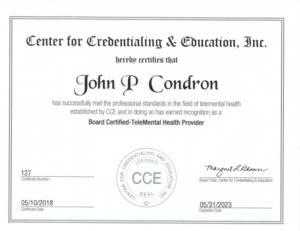 Board Certified Telemental Health Provider — Center for Credentialing and Education, a nationally recognized affiliate of the National Board for Certified Counselors
Board Certified Telemental Health Provider — Center for Credentialing and Education, a nationally recognized affiliate of the National Board for Certified Counselors- US Dept. of Transportation Substance Abuse Professional (10/12/2016) (This is not technically a certification. The DOT establishes requirements for “SAPs,” but does not certify them)
- National Certified Counselor (NCC-255017) – National Board for Certified Counselors (3/31/09)
- Facilitator – Cognitive Self Change – Idaho Model – Idaho Department of Corrections (7/16/09)
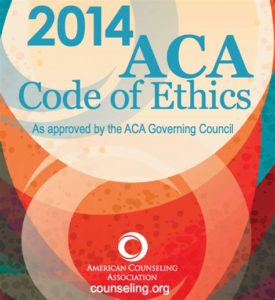 Ethics: I am subject to the Code of Ethics of the American Counseling Association (ACA), as well as that of the American Mental Health Counselors Association (AMHCA), and the National Board for Certified Counselors.
Ethics: I am subject to the Code of Ethics of the American Counseling Association (ACA), as well as that of the American Mental Health Counselors Association (AMHCA), and the National Board for Certified Counselors.
Fees: Sessions are $125 per 50-minute session, for individuals, couples or families, unless other arrangements have been made. Fees for longer sessions are set at the same per-minute rate.
Court Testimony: I will testify in court only in response to a subpoena. Such time is not reimbursable by Medicaid or private insurance. I will charge $200 per hour for testimony in court, including travel, wait, and preparation time.
Cancellation Policy: You can cancel or reschedule an appointment anytime, but must provide at least 24 hours’ notice. If you cancel an appointment with less than 24 hours’ notice and reschedule for an available appointment the same or next day, you will not be charged for the missed appointment. If you cancel with less than 24 hours’ notice and do not reschedule for an available appointment the same or next day, or if you fail to appear for your appointment, you will be charged for the appointment. Please note that Medicaid, Medicare and most insurance companies will not pay for missed appointments. If you think this policy is unfair, too rigid, etc., please let me know; I will be happy to help you find another therapist.
Telehealth/Distance Counseling Information: I am Board Certified as a Telemental Health Provider by the Center for Credentialing and Education, and have provided counseling services electronically, via video and phone, for several years, starting years before COVID forced most healthcare providers online. Though I could theoretically do telehealth from anywhere, I generally work from my office or my home in Pocatello, Idaho. If I am ever working from another location, I will let you know so we can evaluate the possible risks to your privacy.
Speaking of risks from distance counseling, these include, but are not limited to the possibility that the transmission of your private health information could be disrupted or distorted by technical failures or be interrupted by unauthorized persons; or the electronic storage of your health information could be accessed by unauthorized persons. I try to reduce these risks by using only HIPPA-compliant communication platforms that are encrypted for video telemental health communications. The contents of my computers are also encrypted. Though absolute security is impossible, these are “industry standards” for telemental health.
Though I have found video counseling to be very effective, it should be noted that telemental health services and care may not yield the same results nor be as effective as face to-face services. If I believe you would be better served by in-person therapy, I will give you the option of meeting with me in my office, or of seeing another therapist who can provide such services. I will regularly reassess the appropriateness of continuing to deliver services using the technologies we have agreed upon, and modify our plan as needed.
Most insurance carriers now cover telehealth services, but some do not. It is important that you contact your carrier to confirm coverage for this service before starting video counseling..
Idaho is in the US Mountain time zone. When working with people in other parts of the country, I will endeavor to avoid confusion regarding time.
Communication by Email or Text Message: Unless you tell me otherwise, I will use text messaging to send reminders of appointments, rescheduling, etc. However, most email and text message (SMS) communication is not considered “secure,” so I prefer not to use either for the transmission of “protected health information.” I cannot prevent you from sending me confidential information via text or email, but I would prefer that you reserve such sharing for our confidential counseling sessions.
If you choose to contact me via text message or email, I will try to respond within one business day, but cannot promise that I will reply immediately. I never answer the phone or send or read text messages or emails during counseling sessions. That time is reserved for the client or family with whom I am meeting. I do not check voice messages. Please do not leave them for me.
Social Media: I will not “friend” you on social media (e.g., Facebook, Instagram, Twitter, etc.). This is not personal; I just want to maintain a professional relationship with my clients and their families, and find social media largely antithetical to professional relationships.
Emergency Procedures: Note that I am not in a position to provide crisis services; especially when working via telehealth. In case of medical emergency, call 9-1-1 or go to your local Emergency Room. For mental health emergencies, including suicidal thoughts or behavior, please call 9-8-8.
Clients and family members involved in therapy have the following rights:
- To be a participant in treatment decisions, including being provided with information about the methods of therapy, the techniques used, the duration of therapy, if known, and the fee structure;
- To seek a second opinion from another therapist or to terminate therapy at any time;
- To file a complaint without retaliation;
- To refuse treatment;
- To be assured of privacy and confidentiality while receiving services, with the following exceptions:
- Mandatory reporting of abuse, neglect or exploitation of children or vulnerable adults, pursuant to applicable laws;
- Reporting imminent danger to client or others, pursuant to applicable laws;
- Consultation with another licensed professional on behalf of the client thought to be dangerous to self or others;
- Reporting information required in court proceedings or by client’s insurance company, or other relevant agencies;
- Case consultation or supervision with another licensed professional; and
- Defending claims brought by client against therapist.
- To be free from being the object of discrimination on the basis of race, religion, gender, sexual orientation or other unlawful category while receiving counseling services.
- Sexual intimacy is never appropriate between a client and therapist and should be reported to the board that licenses, registers, or certifies the licensee, registrant, or certificate holder.

Complaints: As indicated above, the practice of Counseling is regulated by the states. The controlling factor is the location of the client during the counseling session. For example, if the counselor is located in Idaho and the client lives in Utah, but is on vacation in Florida, the state of Florida has jurisdiction.
Complaints – Idaho: To make a complaint to the Idaho Board of Professional Counselors and Marriage and Family Therapists, follow the instructions on this webpage. If you have questions about the complaint process, call (208) 334-3233, FAX (208) 334-3945, e-mail cou@dopl.idaho.gov, or mail PO Box 83720, Boise, Idaho 83720-0063 (Physical address: 11351 W. Chinden Blvd., Bldg. #6 Boise, ID 83714). The Board’s official website is http://www.dopl.idaho.gov.
Complaints – Utah: To make a complaint to the Utah Division of Occupational and Professional Licensing, follow the instructions on this webpage. If you have questions about the complaint process, call (801) 530-6628, FAX (801) 530-6511, email DOPL@utah.gov, or mail P.O. Box 146741, Salt Lake City, Utah 84114-6741. The Division’s official website is https://dopl.utah.gov/
Complaints – Washington: To make a complaint to the Washington State Dept. of Health, follow the instructions on this webpage. If you have questions about the complaint process, call 360-236-4700. There doesn’t seem to be a process for making a complaint by mail or in-person, but the physical address of the Washington State Dept. of Health is 111 Israel Rd. S.E. Tumwater, WA 98501. The Dept’s official website is https://www.doh.wa.gov/LicensesPermitsandCertificates
Complaints – Florida: To make a complaint to the Florida Board of Clinical Social Work, Marriage and Family Therapy and Mental Health Counseling, follow the instructions on this webpage. If you have questions about the complaint process, call (850) 245-4339, Fax (850) 413-6982, email MQA.ConsumerServices@flhealth.gov, or mail Department of Health, Board of Mental Health Professions, 4052 Bald Cypress Way Bin C-08, Tallahassee, FL 32399-3258. The Dept’s official website is https://floridasmentalhealthprofessions.gov/